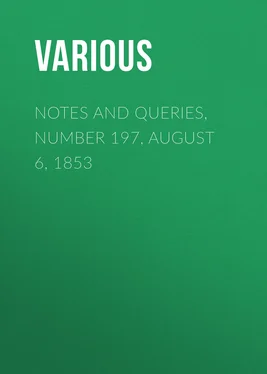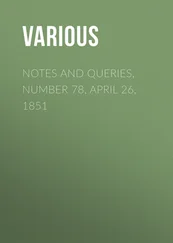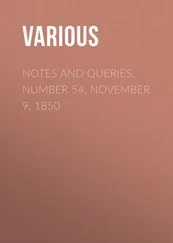Various - Notes and Queries, Number 197, August 6, 1853
Здесь есть возможность читать онлайн «Various - Notes and Queries, Number 197, August 6, 1853» — ознакомительный отрывок электронной книги совершенно бесплатно, а после прочтения отрывка купить полную версию. В некоторых случаях можно слушать аудио, скачать через торрент в формате fb2 и присутствует краткое содержание. Жанр: foreign_antique, periodic, foreign_edu, на английском языке. Описание произведения, (предисловие) а так же отзывы посетителей доступны на портале библиотеки ЛибКат.
- Название:Notes and Queries, Number 197, August 6, 1853
- Автор:
- Жанр:
- Год:неизвестен
- ISBN:нет данных
- Рейтинг книги:4 / 5. Голосов: 1
-
Избранное:Добавить в избранное
- Отзывы:
-
Ваша оценка:
- 80
- 1
- 2
- 3
- 4
- 5
Notes and Queries, Number 197, August 6, 1853: краткое содержание, описание и аннотация
Предлагаем к чтению аннотацию, описание, краткое содержание или предисловие (зависит от того, что написал сам автор книги «Notes and Queries, Number 197, August 6, 1853»). Если вы не нашли необходимую информацию о книге — напишите в комментариях, мы постараемся отыскать её.
Notes and Queries, Number 197, August 6, 1853 — читать онлайн ознакомительный отрывок
Ниже представлен текст книги, разбитый по страницам. Система сохранения места последней прочитанной страницы, позволяет с удобством читать онлайн бесплатно книгу «Notes and Queries, Number 197, August 6, 1853», без необходимости каждый раз заново искать на чём Вы остановились. Поставьте закладку, и сможете в любой момент перейти на страницу, на которой закончили чтение.
Интервал:
Закладка:
"Arnulphus was as quiet as a lambe, and durst never challenge his interest in Jerusalem from Godfrey's donation; as fearing to wrestle with the king, who had him on the hip , and could out him at pleasure for his bad manners."—Book ii. chap. viii. p. 55.
In my note on the word trash , I said (somewhat too peremptorily) that overtop was not even a hunting term (Vol. vii., p. 567.). At the moment I had forgotten the following passage:
"Therefore I would perswade all lovers of hunting to get two or three couple of tryed hounds, and once or twice a week to follow after them a train-scent; and when he is able to top them on all sorts of earth, and to endure heats and colds stoutly, then he may the better relie on his speed and toughness."— The Hunting-horse , chap. vii. p. 71., Oxford, 1685.
SNEEZING AN OMEN AND A DEITY
In the Odyssey , xvii. 541-7., we have, imitating the hexameters, the following passage:
"Thus Penelope spake. Then quickly Telemachus sneez'd loud,
Sounding around all the building : his mother, with smiles at her son, said,
Swiftly addressing her rapid and high-toned words to Eumæus,
'Go then directly, Eumæus, and call to my presence the strange guest.
See'st thou not that my son, ev'ry word I have spoken hath sneez'd at ? 5 5 The practice of snuff-taking has made the sneezing at anything a mark of contempt, in these degenerate days.
Thus portentous, betok'ning the fate of my hateful suitors,
All whom death and destruction await by a doom irreversive.'"
Dionysius Halicarnassus, on Homer's poetry (s. 24.), says, sneezing was considered by that poet as a good sign (σύμβολον ἀγαθόν); and from the Anthology (lib. ii.) the words οὐδὲ λέγει, Ζεῦ σῶσον, ἐὰν πταρῇ, show that it was proper to exclaim "God bless you!" when any one sneezed.
Aristotle, in the Problems (xxxiii. 7.), inquires why sneezing is reckoned a God (διὰ τί τὸν μὲν πταρμὸν, θεὸν ἡγούμεθα εἴναι); to which he suggests, that it may be because it comes from the head, the most divine part about us (θειοτάτου τῶν περὶ ἡμᾶς). Persons having the inclination, but not the power to sneeze, should look at the sun, for reasons he assigns in Problems (xxxiii. 4.).
Plutarch, on the Dæmon of Socrates (s. 11.), states the opinion which some persons had formed, that Socrates' dæmon was nothing else than the sneezing either of himself or others. Thus, if any one sneezed at his right hand, either before or behind him, he pursued any step he had begun; but sneezing at his left hand caused him to desist from his formed purpose. He adds something as to different kinds of sneezing. To sneeze twice was usual in Aristotle's time; but once, or more than twice, was uncommon (Prob. xxxiii. 3.).
Petronius ( Satyr . c. 98.) notices the "blessing" in the following passage:
"Giton collectione spiritus plenus, ter continuo ita sternutavit, ut grabatum concuteret. Ad quem motum Eumolpus conversus, salvere Gitona jubet ."
T. J. Buckton.Birmingham.
ABUSES OF HACKNEY COACHES
[The following proclamation on this subject is of interest at the present moment.]
A Proclamation to restrain the Abuses of Hackney Coaches in the Cities of London and Westminster, and the Suburbs thereof.
Charles R.
Whereas the excessive number of Hackney Coaches, and Coach Horses, in and about the Cities of London and Westminster, and the Suburbs thereof, are found to be a common nuisance to the Publique Damage of Our People by reason of their rude and disorderly standing and passing to and fro, in and about our said Cities and Suburbs, the Streets and Highways being thereby pestred and made impassable, the Pavements broken up, and the Common Passages obstructed and become dangerous, Our Peace violated, and sundry other mischiefs and evils occasioned:
We, taking into Our Princely consideration these apparent Inconveniences, and resolving that a speedy remedy be applied to meet with, and redress them for the future, do, by and with the advice of our Privy Council, publish Our Royal Will and Pleasure to be, and we do by this Our Proclamation expressly charge and command, That no Person or Persons, of what Estate, Degree, or Quality whatsoever, keeping or using any Hackney Coaches, or Coach Horses, do, from and after the Sixth day of November next, permit or suffer the said Coaches and Horses, or any of them, to stand or remain in any the Streets or Passages in or about Our said Cities either of London or Westminster, or the Suburbs belonging to either of them, to be there hired; but that they and every of them keep their said Coaches and Horses within their respective Coach-houses, Stables, and Yards (whither such Persons as desire to hire the same may resort for that purpose), upon pain of Our high displeasure, and such Forfeitures, Pains, and Penalties as may be inflicted for the Contempt of Our Royal Commands in the Premises, whereof we shall expect a strict Accompt.
And for the due execution of Our Pleasure herein, We do further charge and command the Lord Mayor and Aldermen of Our City of London, That they in their several Wards, and Our Justices of Peace within Our said Cities of London and Westminster, and the Liberties and Suburbs thereof, and all other Our Officers and Ministers of Justice, to whom it appertaineth, do take especial care in their respective Limits that this Our Command be duly observed, and that they from time to time return the names of all those who shall wilfully offend in the Premises, to Our Privy Council, and to the end they may be proceeded against by Indictments and Presentments for the Nuisance, and otherwise according to the severity of the Law and Demerits of the Offenders.
Given at Our Court at Whitehall the 18th day of October in the 12th year of Our Reign.
London: Printed by John Bell and Christopher Barker, Printers to the King's most Excellent Majesty, 1660.
Pepys, in his Diary , vol. i. p. 152., under date 8th November, 1660, says:
"To Mr. Fox, who was very civil to me. Notwithstanding this was the first day of the King's proclamation against hackney coaches coming into the streets to stand to be hired, yet I got one to carry me home."
T. D.SHAKSPEARE CORRESPONDENCE
Passage in "The Tempest," Act I. Sc. 2. —
"The sky, it seems, would pour down stinking pitch,
But that the sea, mounting to the welkin's cheek,
Dashes the fire out."
"The manuscript corrector of the folio 1632," Mr. Collier informs us, "has substituted heat for 'cheek,' which is not an unlikely corruption, a person writing only by the ear."
I should say very unlikely: but if heat had been actually printed in the folios, without speculating as to the probability that the press-copy was written from dictation, I should have had no hesitation in altering it to cheek . To this I should have been directed by a parallel passage in Richard II. , Act III. Sc. 3., which has been overlooked by Mr. Collier:
"Methinks, King Richard and myself should meet
With no less terror than the elements
Of fire and water, when their thundering shock
At meeting tears the cloudy cheeks of heaven ."
Commentary here is almost useless. Every one who has any capacity for Shakspearian criticism must feel assured that Shakspeare wrote cheek , and not heat .
The passage I have cited from Richard II. strongly reminds me of an old lady whom I met last autumn on a tour through the Lakes of Cumberland, &c.; and who, during a severe thunderstorm, expressed to me her surprise at the pertinacity of the lightning, adding, "I should think, Sir, that so much water in the heavens would have put all the fire out."
Читать дальшеИнтервал:
Закладка:
Похожие книги на «Notes and Queries, Number 197, August 6, 1853»
Представляем Вашему вниманию похожие книги на «Notes and Queries, Number 197, August 6, 1853» списком для выбора. Мы отобрали схожую по названию и смыслу литературу в надежде предоставить читателям больше вариантов отыскать новые, интересные, ещё непрочитанные произведения.
Обсуждение, отзывы о книге «Notes and Queries, Number 197, August 6, 1853» и просто собственные мнения читателей. Оставьте ваши комментарии, напишите, что Вы думаете о произведении, его смысле или главных героях. Укажите что конкретно понравилось, а что нет, и почему Вы так считаете.












